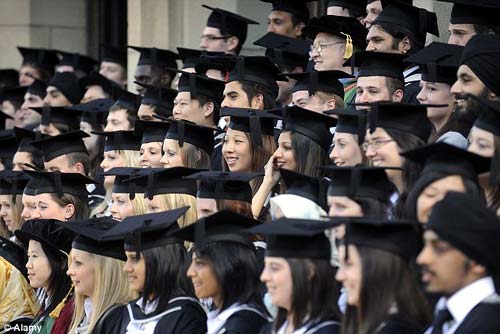
Students wishing to safeguard their careers against changes in the job market should opt for science rather than arts degrees, according to a survey of undergraduates.
一項對本科生的調查顯示,希望降低就業風險的學生最好選擇讀理科專業而非文科專業。
Engineering and chemistry were considered to be the most ‘future proof’, as they are courses most likely to lead to an enduring and adaptable career.
工程學和化學專業的學生最有可能找到一份穩定又容易適應的職業,這兩種專業被認為是未來就業的最佳保證。
Students polled by a college were broadly optimistic that their chosen courses would prepare them for a world in which the job market could change dramatically during their working lives.
這項由皮爾森學院(Pearson College)展開的調查顯示,大多數受訪學生對自己的專業持樂觀態度,認為能順應未來變幻莫測的人才市場。
But opinion was sharply divided over which degrees were best for future-proof careers.
但哪些專業才是未來職業生涯的最佳保證?學生各有觀點。
Eighty-two per cent of respondents believed engineering would help develop future-proof skills, with 74 per cent believing the same of chemistry and 73 per cent of computer science.
82%的受訪者相信工程學專業有助于培養能抵御未來就業市場變化的“萬金油”技能,74%和73%的受訪者分別認為化學專業和計算機科學專業可以培養出“萬金油”技能。
But just 33 per cent of undergraduates believed history would lead to a future-proof career, and 40 per cent English.
只有33%的大學生相信歷史專業能保證未來就業,而40%的大學生選擇英語專業。
However more than two thirds of students - 67 per cent - thought the world of work would be significantly different or completely unrecognisable in 20 years.
另外,67%(超過三分之二)的學生認為20年后全球的工作環境將發生翻天覆地的變化。
The findings, published today, come after Education Secretary Nicky Morgan sparked controversy with claims that teenagers should steer clear of the arts and humanities and opt for science or maths subjects if they want to access the widest range of jobs.
這項調查結果發布不久前,英國教育部長尼基·摩根(Nicky Morgan)在2014年11月發表言論稱,青少年如果未來想增加就業受聘機會,那么應該避開藝術和人文專業而選擇科學或數學專業。這一言論引發諸多爭議。
She said that in previous decades students would only take maths or science if they wanted to pursue a specific career such as medicine or pharmacy, but nowadays that ‘couldn’t be further from the truth’.
她說,在過去幾十年,只有想從事像醫學或藥劑學這種特定的職業的學生才會去選擇數學或科學專業,現如今這種想法已經“嚴重和現實脫節”。
‘If you wanted to do something different, or even if you didn’t know what you wanted to do…then the arts and humanities were what you chose. Because they were useful – we were told – for all kinds of jobs. Of course now we know that couldn’t be further from the truth, that the subjects that keep young people’s options open and unlock doors to all sorts of careers are the STEM (science, technology, engineering and maths) subjects.’
“如果你想做點其他的工作,或者還不知道自己想做什么,那么你就會去選藝術或人文學科,因為大家都說它們很有用——行行都受用。但現在我們知道,這種說法根本不符合事實:能靈活選擇未來職業、行行都吃香的專業變成自然科學、技術、工程學、數學等理工專業。”
She also described maths as ‘the subject that employers value most’ and said that pupils who study A-level maths will earn 10 per cent more over their lifetime.
她同時也認為數學是“雇主最看重的專業”。學生如果通過高深級(英國中等教育高級水平課程)數學考試,一輩子能多掙10%的薪水。
‘These figures show us that too many young people are making choices aged 15 which will hold them back for the rest of their lives,’ she said.
“這些數字告訴我們,有太多年輕人在15歲就做出了會阻礙自己一生發展的決定。”